PHILOSOPHY OF ENLIGHTENMENT (XVIII) Lecture # 9 Content

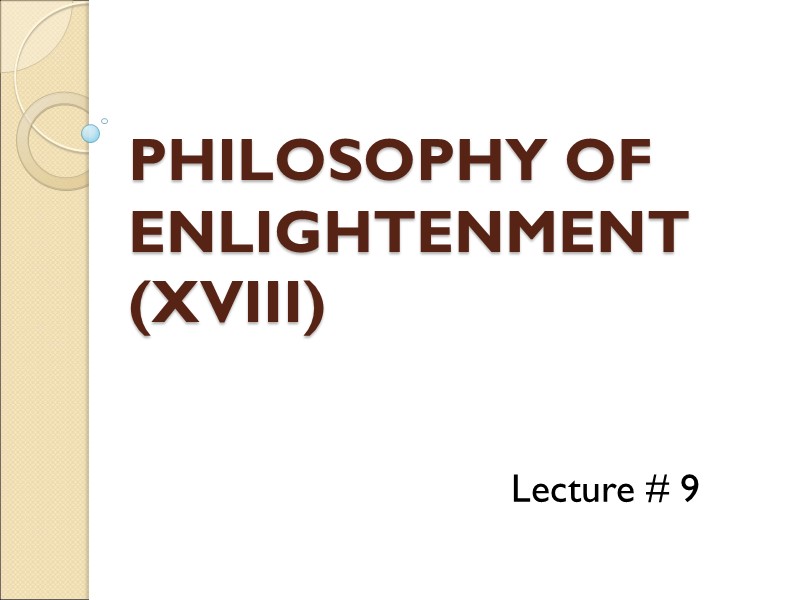
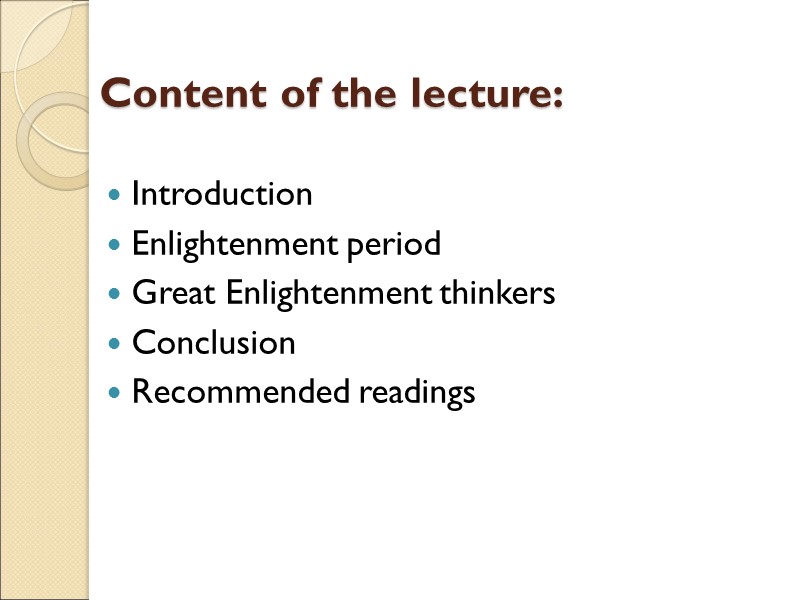
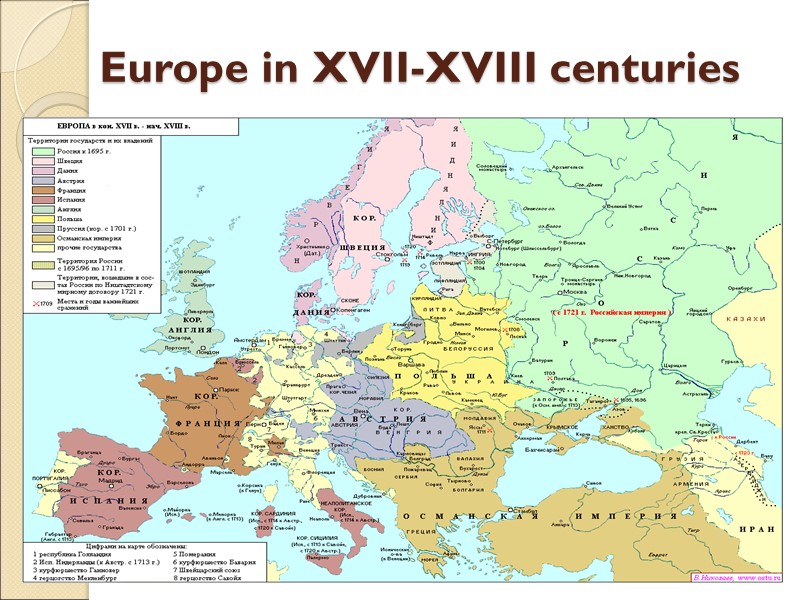
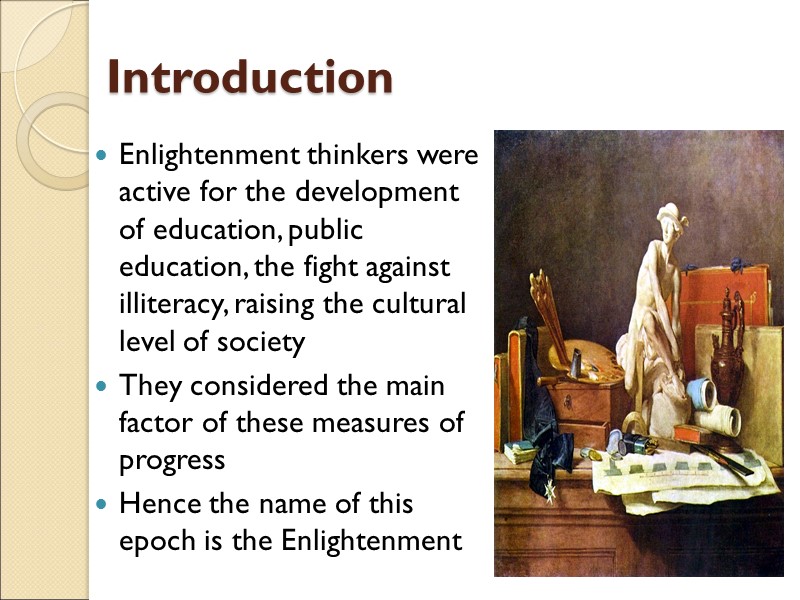
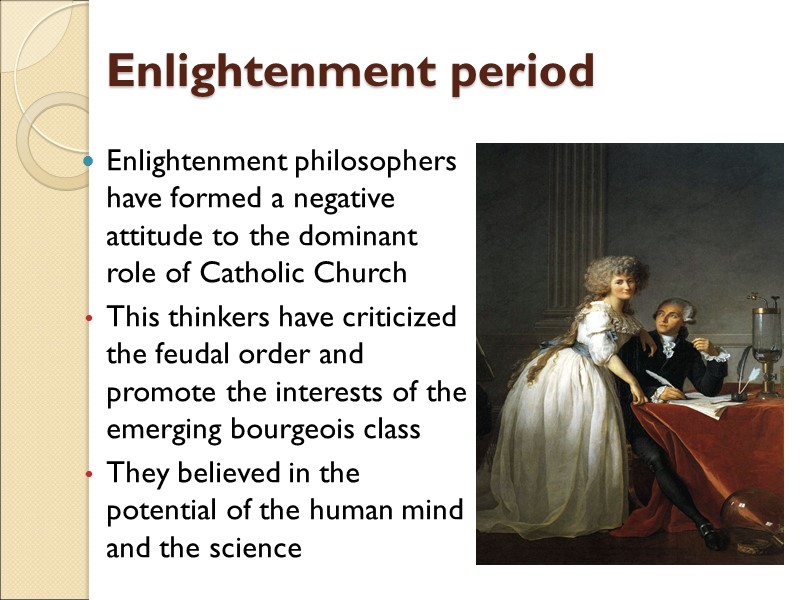
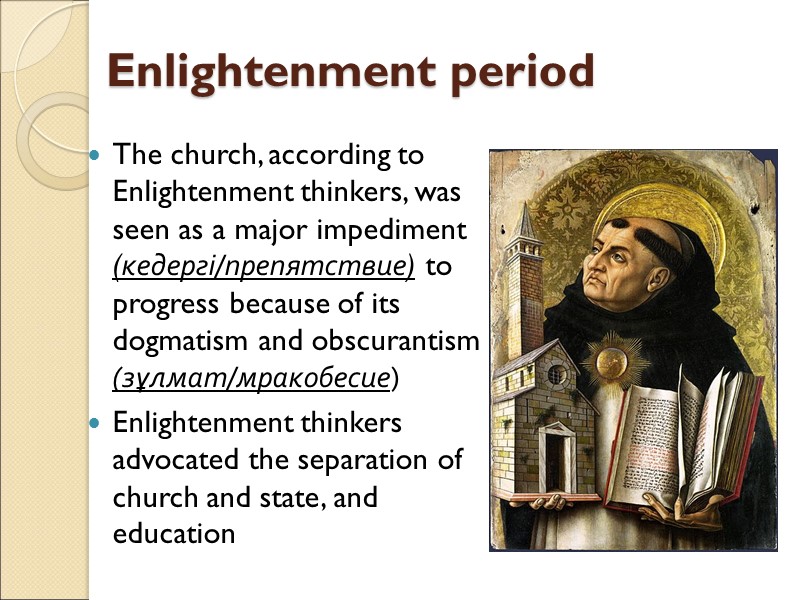
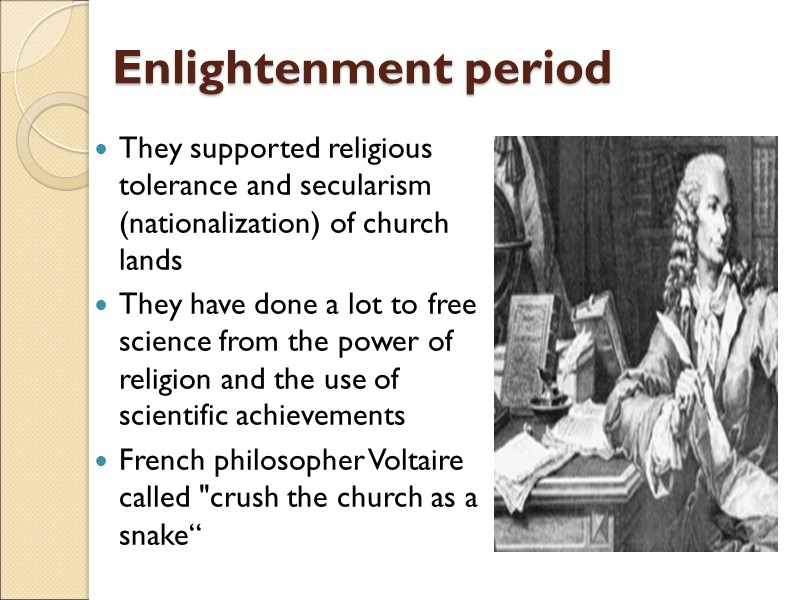
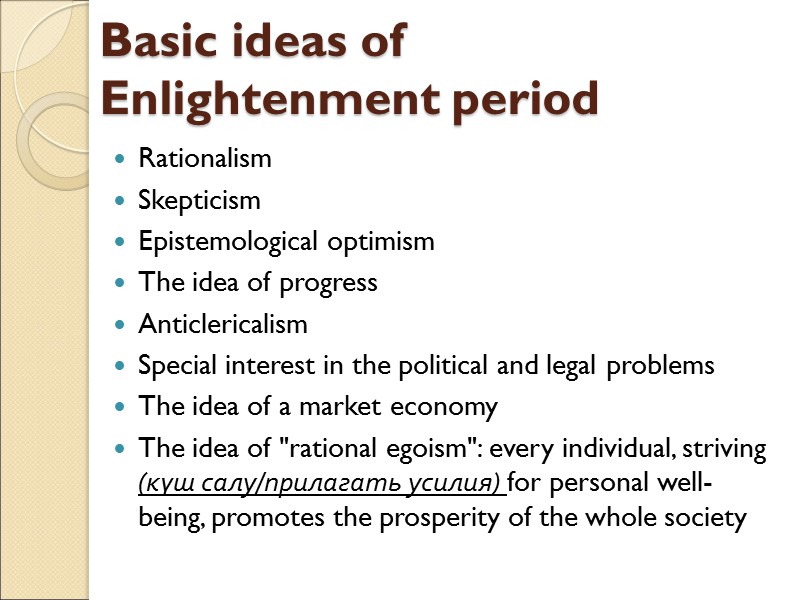
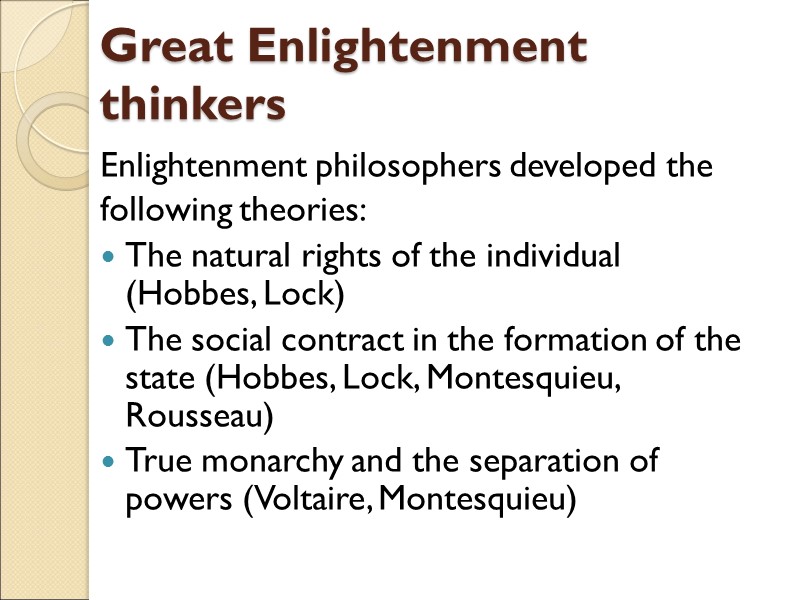
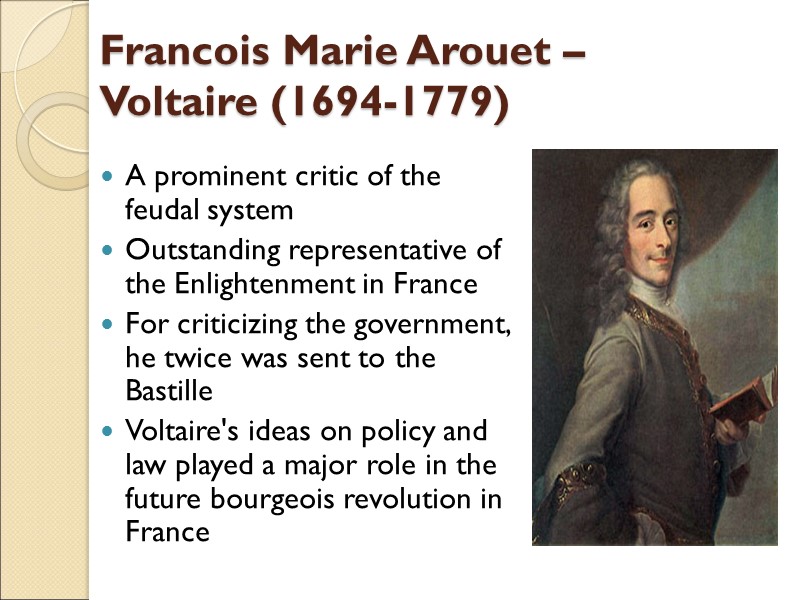
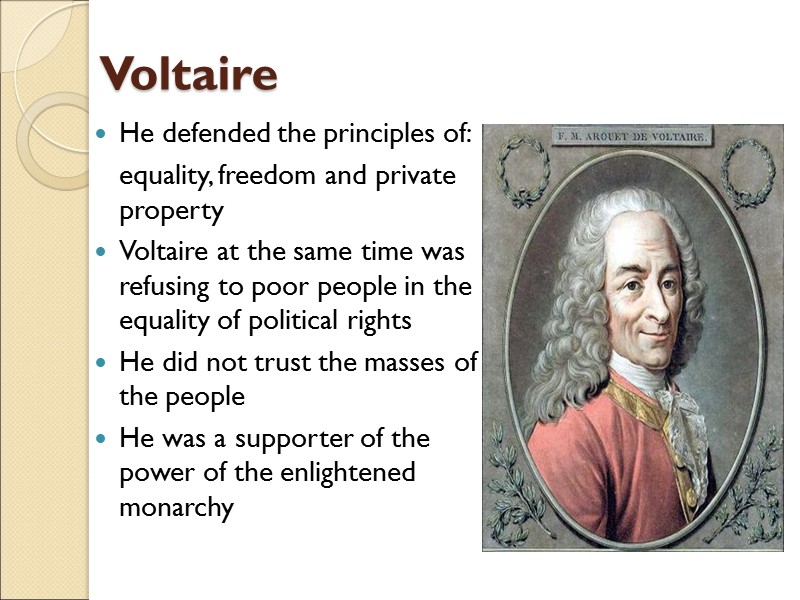
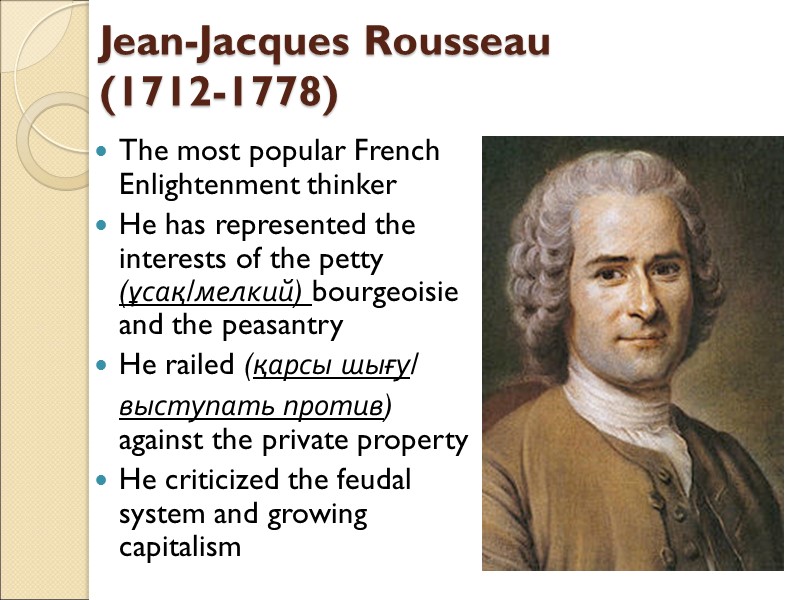
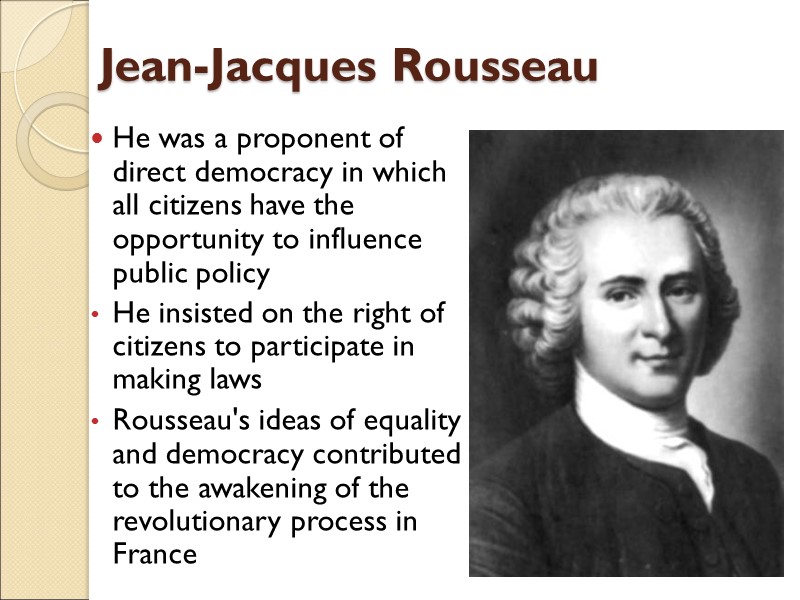
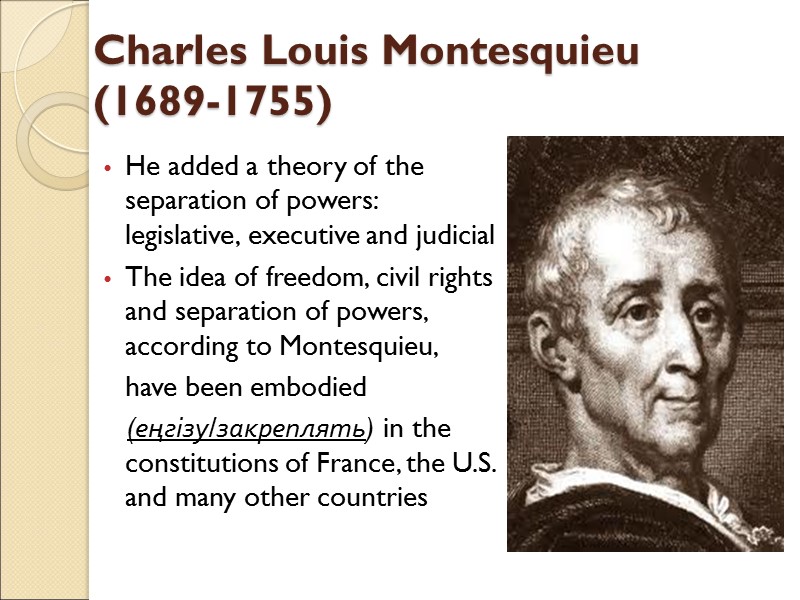
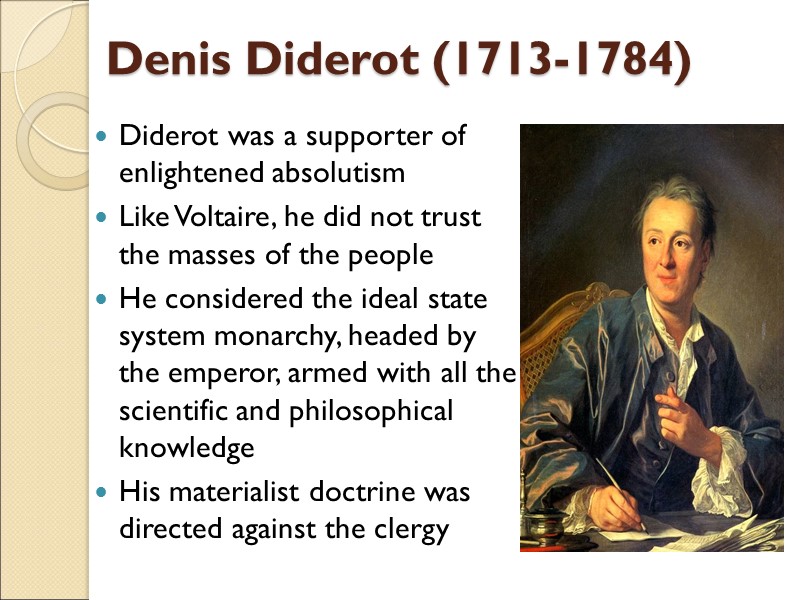
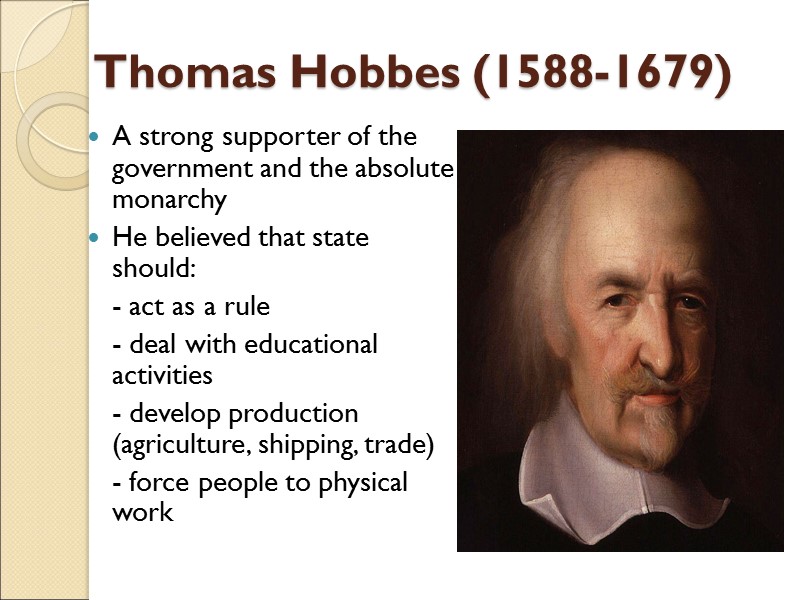
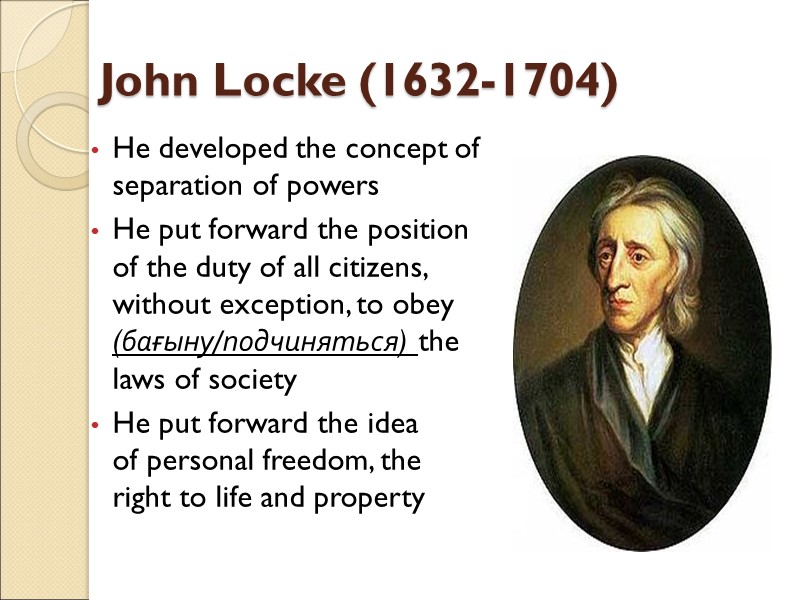
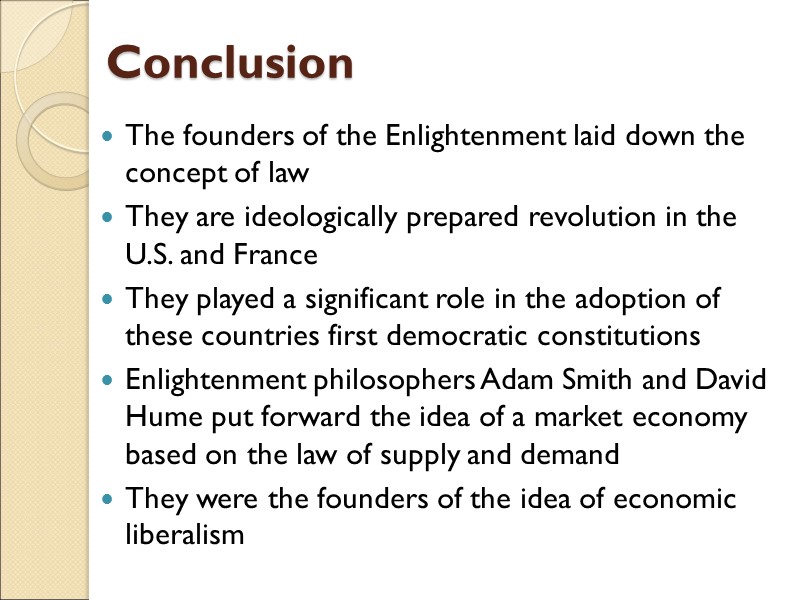
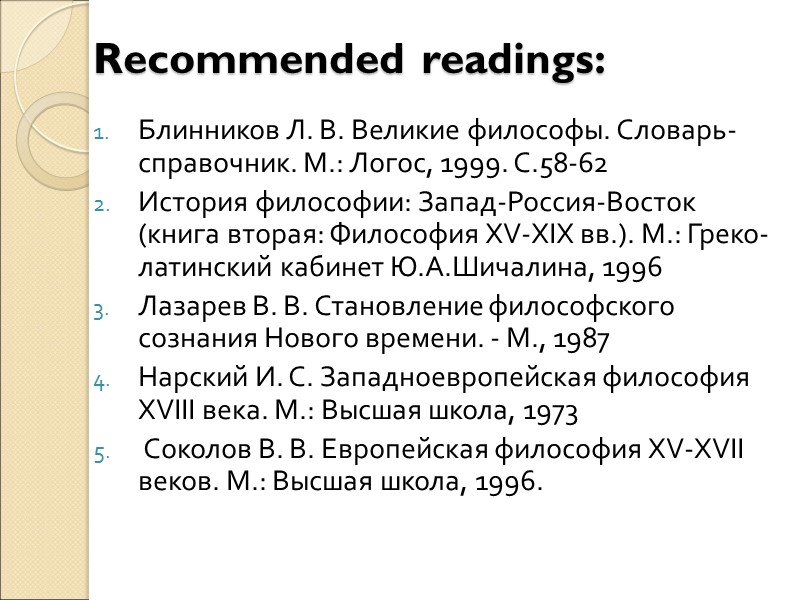
26748-phil-pp-l-_9.enlightenment.ppt
- Количество слайдов: 19
 PHILOSOPHY OF ENLIGHTENMENT (XVIII) Lecture # 9
PHILOSOPHY OF ENLIGHTENMENT (XVIII) Lecture # 9
 Content of the lecture: Introduction Enlightenment period Great Enlightenment thinkers Conclusion Recommended readings
Content of the lecture: Introduction Enlightenment period Great Enlightenment thinkers Conclusion Recommended readings
 Europe in XVII-XVIII centuries
Europe in XVII-XVIII centuries
 Introduction Enlightenment thinkers were active for the development of education, public education, the fight against illiteracy, raising the cultural level of society They considered the main factor of these measures of progress Hence the name of this epoch is the Enlightenment
Introduction Enlightenment thinkers were active for the development of education, public education, the fight against illiteracy, raising the cultural level of society They considered the main factor of these measures of progress Hence the name of this epoch is the Enlightenment
 Enlightenment period Enlightenment philosophers have formed a negative attitude to the dominant role of Catholic Church This thinkers have criticized the feudal order and promote the interests of the emerging bourgeois class They believed in the potential of the human mind and the science
Enlightenment period Enlightenment philosophers have formed a negative attitude to the dominant role of Catholic Church This thinkers have criticized the feudal order and promote the interests of the emerging bourgeois class They believed in the potential of the human mind and the science
 Enlightenment period The church, according to Enlightenment thinkers, was seen as a major impediment (кедергі/препятствие) to progress because of its dogmatism and obscurantism (зұлмат/мракобесие) Enlightenment thinkers advocated the separation of church and state, and education
Enlightenment period The church, according to Enlightenment thinkers, was seen as a major impediment (кедергі/препятствие) to progress because of its dogmatism and obscurantism (зұлмат/мракобесие) Enlightenment thinkers advocated the separation of church and state, and education
 Enlightenment period They supported religious tolerance and secularism (nationalization) of church lands They have done a lot to free science from the power of religion and the use of scientific achievements French philosopher Voltaire called "crush the church as a snake“
Enlightenment period They supported religious tolerance and secularism (nationalization) of church lands They have done a lot to free science from the power of religion and the use of scientific achievements French philosopher Voltaire called "crush the church as a snake“
 Basic ideas of Enlightenment period Rationalism Skepticism Epistemological optimism The idea of progress Anticlericalism Special interest in the political and legal problems The idea of a market economy The idea of "rational egoism": every individual, striving (күш салу/прилагать усилия) for personal well-being, promotes the prosperity of the whole society
Basic ideas of Enlightenment period Rationalism Skepticism Epistemological optimism The idea of progress Anticlericalism Special interest in the political and legal problems The idea of a market economy The idea of "rational egoism": every individual, striving (күш салу/прилагать усилия) for personal well-being, promotes the prosperity of the whole society
 Great Enlightenment thinkers Enlightenment philosophers developed the following theories: The natural rights of the individual (Hobbes, Lock) The social contract in the formation of the state (Hobbes, Lock, Montesquieu, Rousseau) True monarchy and the separation of powers (Voltaire, Montesquieu)
Great Enlightenment thinkers Enlightenment philosophers developed the following theories: The natural rights of the individual (Hobbes, Lock) The social contract in the formation of the state (Hobbes, Lock, Montesquieu, Rousseau) True monarchy and the separation of powers (Voltaire, Montesquieu)
 Francois Marie Arouet – Voltaire (1694-1779) A prominent critic of the feudal system Outstanding representative of the Enlightenment in France For criticizing the government, he twice was sent to the Bastille Voltaire's ideas on policy and law played a major role in the future bourgeois revolution in France
Francois Marie Arouet – Voltaire (1694-1779) A prominent critic of the feudal system Outstanding representative of the Enlightenment in France For criticizing the government, he twice was sent to the Bastille Voltaire's ideas on policy and law played a major role in the future bourgeois revolution in France
 Voltaire He defended the principles of: equality, freedom and private property Voltaire at the same time was refusing to poor people in the equality of political rights He did not trust the masses of the people He was a supporter of the power of the enlightened monarchy
Voltaire He defended the principles of: equality, freedom and private property Voltaire at the same time was refusing to poor people in the equality of political rights He did not trust the masses of the people He was a supporter of the power of the enlightened monarchy
 Jean-Jacques Rousseau (1712-1778) The most popular French Enlightenment thinker He has represented the interests of the petty (ұсақ/мелкий) bourgeoisie and the peasantry He railed (қарсы шығу/ выступать против) against the private property He criticized the feudal system and growing capitalism
Jean-Jacques Rousseau (1712-1778) The most popular French Enlightenment thinker He has represented the interests of the petty (ұсақ/мелкий) bourgeoisie and the peasantry He railed (қарсы шығу/ выступать против) against the private property He criticized the feudal system and growing capitalism
 Jean-Jacques Rousseau He was a proponent of direct democracy in which all citizens have the opportunity to influence public policy He insisted on the right of citizens to participate in making laws Rousseau's ideas of equality and democracy contributed to the awakening of the revolutionary process in France
Jean-Jacques Rousseau He was a proponent of direct democracy in which all citizens have the opportunity to influence public policy He insisted on the right of citizens to participate in making laws Rousseau's ideas of equality and democracy contributed to the awakening of the revolutionary process in France
 Charles Louis Montesquieu (1689-1755) He added a theory of the separation of powers: legislative, executive and judicial The idea of freedom, civil rights and separation of powers, according to Montesquieu, have been embodied (еңгізу/закреплять) in the constitutions of France, the U.S. and many other countries
Charles Louis Montesquieu (1689-1755) He added a theory of the separation of powers: legislative, executive and judicial The idea of freedom, civil rights and separation of powers, according to Montesquieu, have been embodied (еңгізу/закреплять) in the constitutions of France, the U.S. and many other countries
 Denis Diderot (1713-1784) Diderot was a supporter of enlightened absolutism Like Voltaire, he did not trust the masses of the people He considered the ideal state system monarchy, headed by the emperor, armed with all the scientific and philosophical knowledge His materialist doctrine was directed against the clergy
Denis Diderot (1713-1784) Diderot was a supporter of enlightened absolutism Like Voltaire, he did not trust the masses of the people He considered the ideal state system monarchy, headed by the emperor, armed with all the scientific and philosophical knowledge His materialist doctrine was directed against the clergy
 Thomas Hobbes (1588-1679) A strong supporter of the government and the absolute monarchy He believed that state should: - act as a rule - deal with educational activities - develop production (agriculture, shipping, trade) - force people to physical work
Thomas Hobbes (1588-1679) A strong supporter of the government and the absolute monarchy He believed that state should: - act as a rule - deal with educational activities - develop production (agriculture, shipping, trade) - force people to physical work
 John Locke (1632-1704) He developed the concept of separation of powers He put forward the position of the duty of all citizens, without exception, to obey (бағыну/подчиняться) the laws of society He put forward the idea of personal freedom, the right to life and property
John Locke (1632-1704) He developed the concept of separation of powers He put forward the position of the duty of all citizens, without exception, to obey (бағыну/подчиняться) the laws of society He put forward the idea of personal freedom, the right to life and property
 Conclusion The founders of the Enlightenment laid down the concept of law They are ideologically prepared revolution in the U.S. and France They played a significant role in the adoption of these countries first democratic constitutions Enlightenment philosophers Adam Smith and David Hume put forward the idea of a market economy based on the law of supply and demand They were the founders of the idea of economic liberalism
Conclusion The founders of the Enlightenment laid down the concept of law They are ideologically prepared revolution in the U.S. and France They played a significant role in the adoption of these countries first democratic constitutions Enlightenment philosophers Adam Smith and David Hume put forward the idea of a market economy based on the law of supply and demand They were the founders of the idea of economic liberalism
 Recommended readings: Блинников Л. В. Великие философы. Словарь-справочник. М.: Логос, 1999. С.58-62 История философии: Запад-Россия-Восток (книга вторая: Философия ХV-ХIХ вв.). М.: Греко-латинский кабинет Ю.А.Шичалина, 1996 Лазарев В. В. Становление философского сознания Нового времени. - М., 1987 Нарский И. С. Западноевропейская философия XVIII века. М.: Высшая школа, 1973 Соколов В. В. Европейская философия XV-XVII веков. М.: Высшая школа, 1996.
Recommended readings: Блинников Л. В. Великие философы. Словарь-справочник. М.: Логос, 1999. С.58-62 История философии: Запад-Россия-Восток (книга вторая: Философия ХV-ХIХ вв.). М.: Греко-латинский кабинет Ю.А.Шичалина, 1996 Лазарев В. В. Становление философского сознания Нового времени. - М., 1987 Нарский И. С. Западноевропейская философия XVIII века. М.: Высшая школа, 1973 Соколов В. В. Европейская философия XV-XVII веков. М.: Высшая школа, 1996.

